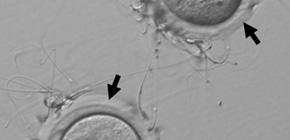
New perspective in male infertility
Identification of New Molecular Target for Male Contraceptives
To date, oral contraceptives for women have been developed and used worldwide, but, there are no oral contraceptives for men.
A group of researchers at Osaka University found that sperm calcineurin deficient male mice are infertile. The development of a drug that specifically inhibits sperm calcineurin may be the long-sought out reversible male contraceptive that works in a short time span. The group also discovered that the flexibility of the sperm midpiece is essential for fertilizing ability, which opens up new possibilities in studying male infertility.
Calcineurin is a well-characterized calcium-dependent phosphatase and its inhibitors (CsA and FK506) have been clinically used for immunosuppression after organ transplantation. In toxicity tests using rats and mice, it has been reported that these drugs also impair male fertility.
The group led by Professor Masahito IKAWA at Osaka University found that sperm-specific calcineurin is essential for proper sperm motility. The group identified PPP3CC/PPP3R2 as the form of calcineurin that is specifically localized in the sperm and named it sperm calcineurin. Assistant Professor Haruhiko MIYATA generated sperm calcineurin deficient mice and found that the mutant male mice were infertile. The group also found that wild type mice treated with calcineurin inhibitors such as Cyclosporine A (CsA) and FK506 became infertile within 2 weeks. Their fertility recovered within a week after the discontinuation of the drug treatment.
Figure 1. Sperm motility
- ( A ) Mouse sperm. Tail can be divided into midpiece and principle piece.
- ( B ) Flagellar bending patterns. Midpiece (arrow) is rigid if sperm calcineurin is missing.
- ( C ) Without sperm calcineurin, sperm cannot penetrate the zona pellucida (arrows) that surrounds the oocyte.
Figure 2. Function of sperm calcineurin in mice
Sperm produced in the testis become motile during epididymal transit. During this transit, sperm calcineurin (PPP3CC/PPP3R2) confers midpiece flexibility. In contrast to spermatogenesis (about 35 days), epididymal transit takes a short time (about 10 days). Male contraceptives that target the epididymis work more rapidly than those targeting the testis.
To learn more about this research, please view the full research report entitled “ Sperm calcineurin inhibition prevents mouse fertility with implications for male contraceptive ” at this page of the S cience website.
Related links
